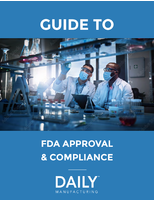ASTM to develop standards for sustainable dentistry.
Press Release Summary:
To recognize and encourage sustainable dental practices, ASTM Subcommittee E60.80 on General Sustainability Standards has begun to develop proposed new standard, ASTM WK34710, Practice for Sustainable Dentistry. Dental professionals will be able to use ASTM WK34710 to identify sustainable methods for selecting materials and products; determining appropriate disposal of products; building or remodeling dental offices; and discharging materials into waste stream.
Original Press Release:
ASTM International to Develop Standards for Sustainable Dentistry
W. CONSHOHOCKEN, Pa., —Sustainability now plays an important role in many professional fields and dentistry is no exception. To recognize and encourage sustainable dental practices, ASTM Subcommittee E60.80 on General Sustainability Standards has begun to develop a proposed new standard, ASTM WK34710, Practice for Sustainable Dentistry. E60.80 is under the jurisdiction of ASTM International Committee E60 on Sustainability.
According to Beverly Oviedo, an E60 member and a sustainability educator and consultant with 25 years of dental management experience, the purpose of ASTM WK34710 will be to assist dental practices in becoming more sustainable environmentally, economically and socially. The proposed new standard will also identify key issues related to sustainability in the manufacture and use of dental products to assist the dental profession in promoting and applying sustainable practices in oral health care.
“We are closely investigating the dental organization as a means to integrate the value of sustainability,” says Oviedo. “Sustainable development best practices take into consideration decision-making related to three main pillars: people, planet and profit.”
ASTM WK34710 will define a dental management system model to illustrate how to embed the value of corporate social responsibility into the practice of dentistry, as well as to create and promote recommended sustainable best practices. Dental professionals will be able to use ASTM WK34710 to identify sustainable methods for selecting materials and products; determining appropriate disposal of products; building or remodeling dental offices; and discharging materials into the waste stream.
Oviedo feels that once it is approved the standard will be used by a wide variety of entities connected to dentistry:
• Manufacturers will have the impetus to reduce packaging, with more consideration being given to combining shipments, rather than using single item packaging. The proposed standard could also create more interest in the development of sustainable dental products.
• Regulators may eventually use ASTM WK34710 to reward dental practices that demonstrate leadership roles in sustainable development.
• Consumers will be informed of the benefits to them of sustainable dental practices and products.
• Laboratories will be able to reduce their impact on the environment by incorporating sustainable waste management practices.
Oviedo notes that the journey to sustainability is an ongoing process. “Each dental organization, once it has embedded the value of sustainability, will determine independently how to align this value with their business,” says Oviedo. “One organization may want to use recycled paper only to start out. Another organization might want to adopt all new practices, such as new employee recruitment based on sustainable values, human resources sustainability training, and all new materials for construction and products made from renewable resources.”
Oviedo invites all interested parties, including “dental professionals with a passion for the well being of the planet, their organization and people” to become involved in the standard development process for ASTM WK34710.
ASTM International is one of the largest international standards development and delivery systems in the world. ASTM International meets the World Trade Organization (WTO) principles for the development of international standards: coherence, consensus, development dimension, effectiveness, impartiality, openness, relevance and transparency. ASTM standards are accepted and used in research and development, product testing, quality systems and commercial transactions.
For more news in this sector, visit www.astm.org/sn-environmental or follow us on Twitter @ASTMEnvironment.
ASTM Committee E60 Next Meeting: April 16-18, 2013, April committee week, Indianapolis, Ind.
Technical Contact: Beverly A. Oviedo, Sustainable Solutions by Design, Monterey, Calif., Phone: 530-518-6070; boviedo@ssbydesign.com
ASTM Staff Contact: Stephen Mawn, Phone: 610-832-9726; smawn@astm.org
ASTM PR Contact: Barbara Schindler, Phone: 610-832-9603; bschindl@astm.org




